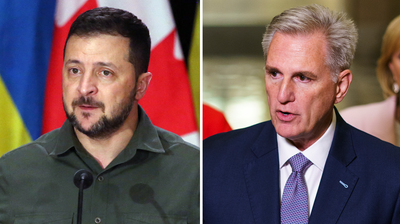
Ukrainian President Volodymyr Zelensky left Washington last week with a dire warning that Russia is counting on eroding U.S. support to win its war against his country.
“It’s not about some kind of weapon, or some money, it’s not about it, because … we will have some help,” Zelensky told a small group of news outlets in Washington last week, including The Hill. “But in two or three months, if we will lose some support, it means that we can lose the war.”
Zelensky’s appearance seemed to make a difference with GOP leaders, particularly in the Senate, which is moving forward with a stopgap spending measure that includes $6.15 billion in support for Ukraine despite the vocal opposition of Sen. Rand Paul (R-Ky.), who has threatened to hold up the legislation over the issue.
Senate Republicans also think it will be easier to get funding for Ukraine passed by Congress if it is included in must-pass legislation.
But Ukraine is complicating matters in the House, where dozens of Republicans oppose continued funding for Ukraine.
On Friday night, hours after his conference rejected his previous proposal to keep the government open, Speaker Kevin McCarthy (R-Calif.) floated the idea of a "clean" two-week stopgap measure with no aid for Ukraine.
“I think if we had a clean one without Ukraine on it, we could probably be able to move that through,” McCarthy said after a lengthy GOP conference meeting Friday when asked about a clean continuing resolution. “I think if the Senate puts Ukraine on there and focuses Ukraine over America, I think that could cause real problems.”
McCarthy's comments underline the importance Ukraine aid is now taking in the fight over the shutdown.
There have been signs this week of increasing opposition to funding for Ukraine in the House GOP.
In a series of votes Wednesday, a majority of GOP House lawmakers rejected efforts to cut back on funding for Ukraine, voting down a trio of amendments to a Pentagon appropriations bill that would have curtailed Washington’s financial support for Kyiv.
But on Thursday night, more than half of Republicans in the House voted against $300 million in aid to Ukraine, although it passed in a 311-117 vote. McCarthy at the last minute stripped the aid from the defense bill — the provision had been included since 2016 — so it could pass on a GOP-only vote, while pushing through the Ukraine funding separately on the back of Democrats.
Zelensky during his visit last week said he believed that McCarthy supported Ukraine but understood he faces challenges, saying the process would not be “simple.”
McCarthy is under a constant threat from various conservatives to unseat him through a procedural motion known as a “motion to vacate the chair,” which would lead to a vote to end his Speakership.
McCarthy’s moves this week do suggest he is trying to maintain support for Ukraine, but even before floating the Ukraine-free measure Friday night, he'd insisted the issue should be kept out of the stopgap measure and dealt with on its own as a supplemental.
Rep. Patrick McHenry (R-N.C.), a McCarthy ally who has repeatedly backed Kyiv in House votes, criticized the decision to include Ukraine money in the Senate stopgap, calling it a “strategic political mistake” and “so dumb” to bring Ukraine funding into the government spending fight.
McHenry specifically blamed the Biden administration in his public comments, but the decision to do so was backed by Senate GOP Leader Mitch McConnell (R-Ky.) and his leadership team.
Opponents of Ukraine funding in the House feel like they are gaining momentum.
The House vote on providing $300 million in assistance to Ukraine on Thursday night received 117 GOP “no” votes, more than a similar vote Wednesday night.
A similar phenomenon played out with an amendment proposed by Rep. Matt Gaetz (R-Fl.) that called for prohibiting any U.S. assistance for Ukraine. The amendment failed in a vote Wednesday night, but it had 93 Republicans voting in favor, an increase from the 70 GOP members who voted for the amendment in July.
Matthew Tragesser, communications director for Rep. Andy Biggs (R-Ariz.), told The Hill that the congressman’s “colleagues in the House are finally starting to realize that the United States should not be funding another never-ending war overseas.”
Some GOP critics of U.S. assistance for Ukraine say the Biden administration has failed to explain what their goals are in supporting Kyiv. President Biden has said the U.S. will be with Ukraine “as long as it takes” for it to survive Russia’s aggression.
Zelensky’s visit last week certainly didn’t change the views of lawmakers who have long opposed U.S. support for Ukraine.
“I just don’t think that continuing to spend money without any clear plan … is wise, I mean that’s been my position for a long, long time. I didn’t hear anything that changed that,” Sen. Josh Hawley (R-Mo.) told The Hill.
Sen. John Hickenlooper (D-Colo.) said it's important that Congress provide more money for Ukraine in the wake of Zelensky's visit as a sign of the United States' continuing commitment to supporting its war against Russia.
“I think it's a message to the world if we interrupt that flow of support, so I think it's very important that we continue those resources,” he said. “To interrupt it would do grave damage to our relationship with the world.”
Hickenlooper said “there's significant support in the House and the Senate” for backing Ukraine.
“I think he knew that we were coming together with a budget and he came to make his case before we did the budget,” Hickenlooper added. “I think he was coming to thank us. He was profuse in his gratitude but also to say, ‘We can win this.’”
Emily Brooks and Alexander Bolton contributed to this report.